323LON Developing Business Skills: Development Needs Analysis
VerifiedAdded on 2023/05/28
|33
|7530
|211
Report
AI Summary
This report presents a personal development needs analysis, focusing on the author's learning style as an auditory and diverging learner, referencing Kolb's experiential learning theory, cognitive theory, and Honey and Mumford’s learning styles. It identifies strengths and weaknesses related to learning preferences and the impact on academic and professional performance. The analysis includes transferrable skills, self-awareness methods, and a personal development plan to address weaknesses and enhance strengths. The report uses psychometric tests and feedback to understand competencies and create a development strategy, aiming to improve both academic and professional capabilities. Desklib provides similar solved assignments for students.
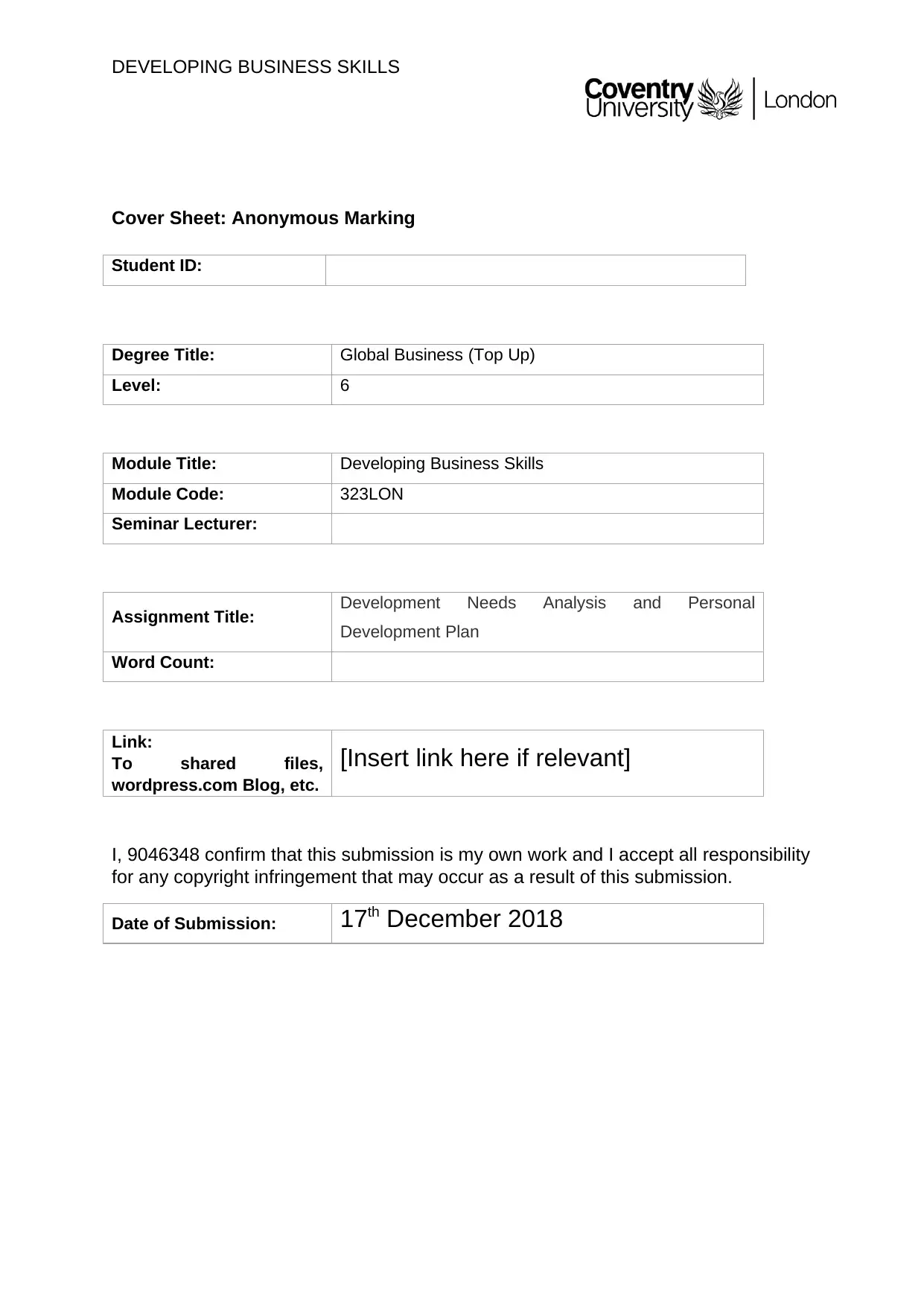
DEVELOPING BUSINESS SKILLS
Cover Sheet: Anonymous Marking
Student ID:
Degree Title: Global Business (Top Up)
Level: 6
Module Title: Developing Business Skills
Module Code: 323LON
Seminar Lecturer:
Assignment Title: Development Needs Analysis and Personal
Development Plan
Word Count:
Link:
To shared files,
wordpress.com Blog, etc.
[Insert link here if relevant]
I, 9046348 confirm that this submission is my own work and I accept all responsibility
for any copyright infringement that may occur as a result of this submission.
Date of Submission: 17th December 2018
Cover Sheet: Anonymous Marking
Student ID:
Degree Title: Global Business (Top Up)
Level: 6
Module Title: Developing Business Skills
Module Code: 323LON
Seminar Lecturer:
Assignment Title: Development Needs Analysis and Personal
Development Plan
Word Count:
Link:
To shared files,
wordpress.com Blog, etc.
[Insert link here if relevant]
I, 9046348 confirm that this submission is my own work and I accept all responsibility
for any copyright infringement that may occur as a result of this submission.
Date of Submission: 17th December 2018
Paraphrase This Document
Need a fresh take? Get an instant paraphrase of this document with our AI Paraphraser
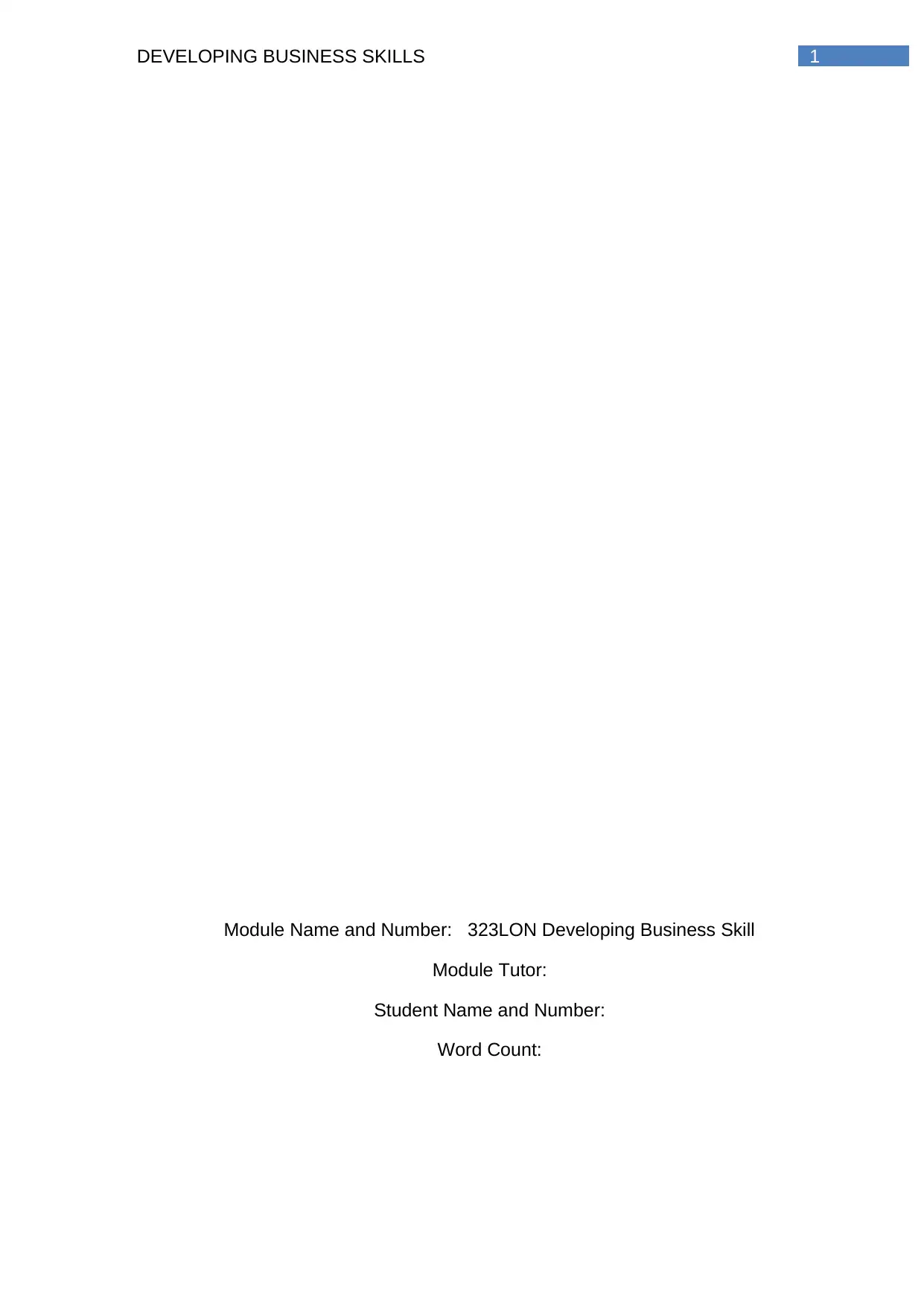
1DEVELOPING BUSINESS SKILLS
Module Name and Number: 323LON Developing Business Skill
Module Tutor:
Student Name and Number:
Word Count:
Module Name and Number: 323LON Developing Business Skill
Module Tutor:
Student Name and Number:
Word Count:
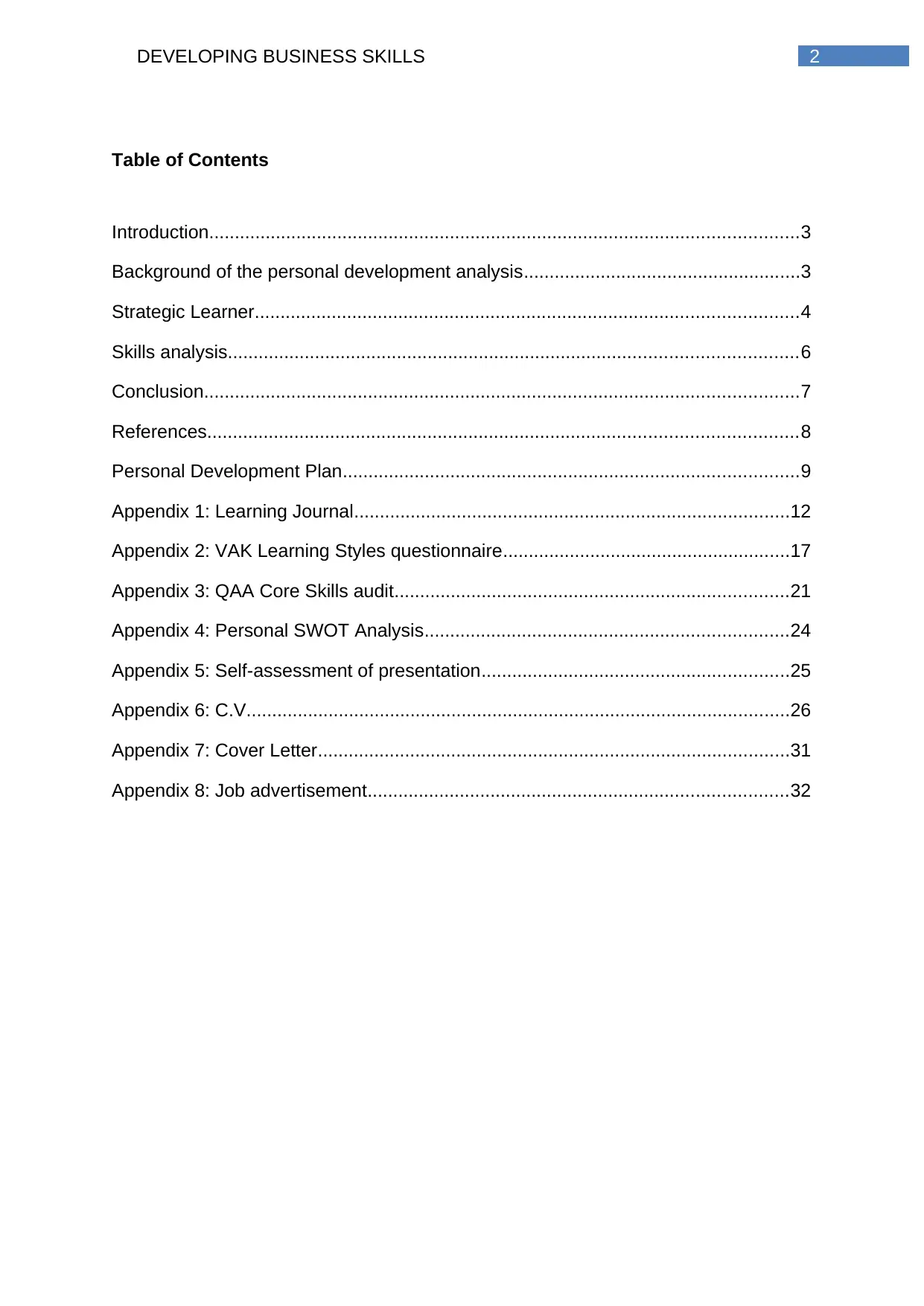
2DEVELOPING BUSINESS SKILLS
Table of Contents
Introduction...................................................................................................................3
Background of the personal development analysis......................................................3
Strategic Learner..........................................................................................................4
Skills analysis...............................................................................................................6
Conclusion....................................................................................................................7
References...................................................................................................................8
Personal Development Plan.........................................................................................9
Appendix 1: Learning Journal.....................................................................................12
Appendix 2: VAK Learning Styles questionnaire........................................................17
Appendix 3: QAA Core Skills audit.............................................................................21
Appendix 4: Personal SWOT Analysis.......................................................................24
Appendix 5: Self-assessment of presentation............................................................25
Appendix 6: C.V..........................................................................................................26
Appendix 7: Cover Letter............................................................................................31
Appendix 8: Job advertisement..................................................................................32
Table of Contents
Introduction...................................................................................................................3
Background of the personal development analysis......................................................3
Strategic Learner..........................................................................................................4
Skills analysis...............................................................................................................6
Conclusion....................................................................................................................7
References...................................................................................................................8
Personal Development Plan.........................................................................................9
Appendix 1: Learning Journal.....................................................................................12
Appendix 2: VAK Learning Styles questionnaire........................................................17
Appendix 3: QAA Core Skills audit.............................................................................21
Appendix 4: Personal SWOT Analysis.......................................................................24
Appendix 5: Self-assessment of presentation............................................................25
Appendix 6: C.V..........................................................................................................26
Appendix 7: Cover Letter............................................................................................31
Appendix 8: Job advertisement..................................................................................32
⊘ This is a preview!⊘
Do you want full access?
Subscribe today to unlock all pages.

Trusted by 1+ million students worldwide
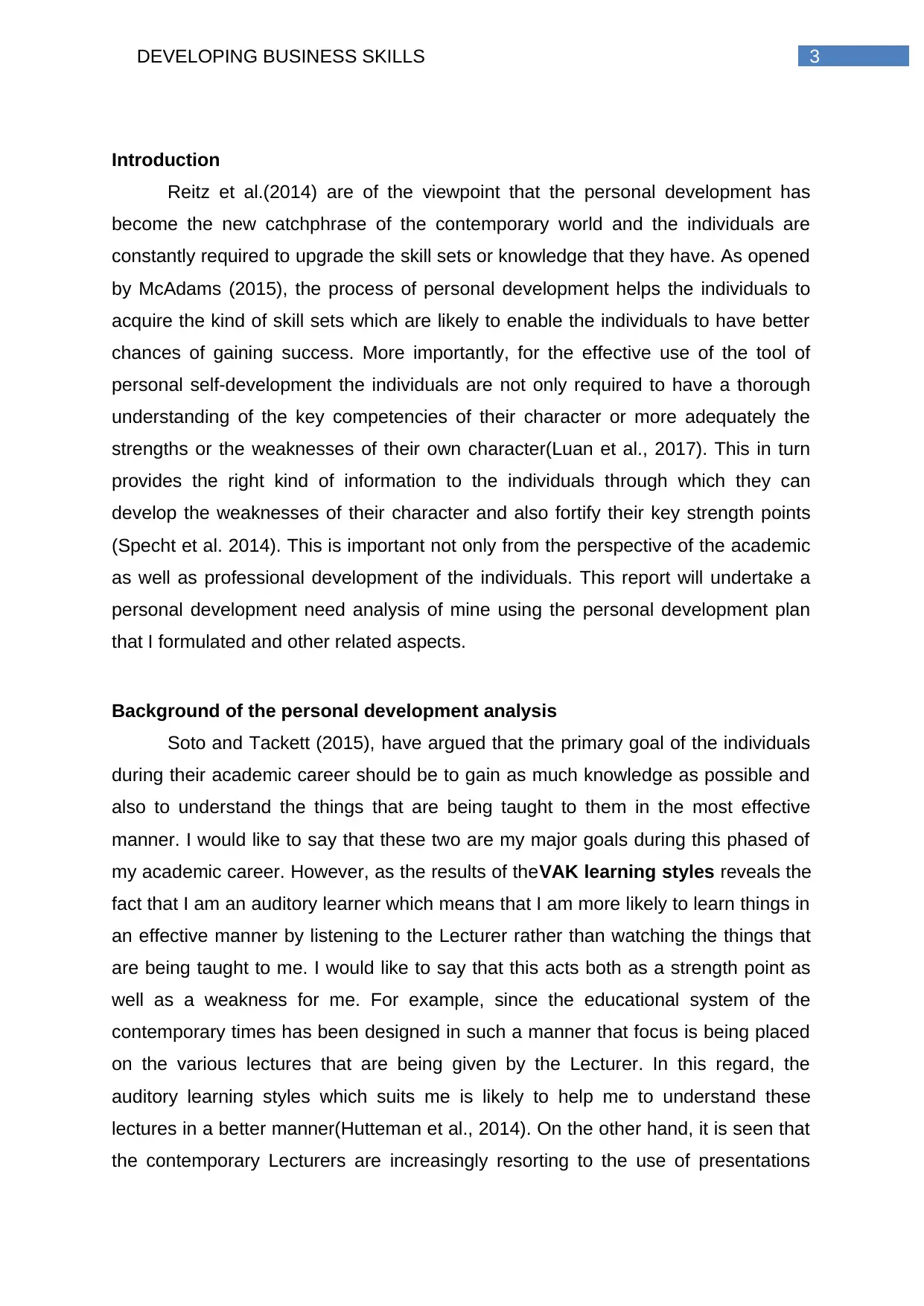
3DEVELOPING BUSINESS SKILLS
Introduction
Reitz et al.(2014) are of the viewpoint that the personal development has
become the new catchphrase of the contemporary world and the individuals are
constantly required to upgrade the skill sets or knowledge that they have. As opened
by McAdams (2015), the process of personal development helps the individuals to
acquire the kind of skill sets which are likely to enable the individuals to have better
chances of gaining success. More importantly, for the effective use of the tool of
personal self-development the individuals are not only required to have a thorough
understanding of the key competencies of their character or more adequately the
strengths or the weaknesses of their own character(Luan et al., 2017). This in turn
provides the right kind of information to the individuals through which they can
develop the weaknesses of their character and also fortify their key strength points
(Specht et al. 2014). This is important not only from the perspective of the academic
as well as professional development of the individuals. This report will undertake a
personal development need analysis of mine using the personal development plan
that I formulated and other related aspects.
Background of the personal development analysis
Soto and Tackett (2015), have argued that the primary goal of the individuals
during their academic career should be to gain as much knowledge as possible and
also to understand the things that are being taught to them in the most effective
manner. I would like to say that these two are my major goals during this phased of
my academic career. However, as the results of theVAK learning styles reveals the
fact that I am an auditory learner which means that I am more likely to learn things in
an effective manner by listening to the Lecturer rather than watching the things that
are being taught to me. I would like to say that this acts both as a strength point as
well as a weakness for me. For example, since the educational system of the
contemporary times has been designed in such a manner that focus is being placed
on the various lectures that are being given by the Lecturer. In this regard, the
auditory learning styles which suits me is likely to help me to understand these
lectures in a better manner(Hutteman et al., 2014). On the other hand, it is seen that
the contemporary Lecturers are increasingly resorting to the use of presentations
Introduction
Reitz et al.(2014) are of the viewpoint that the personal development has
become the new catchphrase of the contemporary world and the individuals are
constantly required to upgrade the skill sets or knowledge that they have. As opened
by McAdams (2015), the process of personal development helps the individuals to
acquire the kind of skill sets which are likely to enable the individuals to have better
chances of gaining success. More importantly, for the effective use of the tool of
personal self-development the individuals are not only required to have a thorough
understanding of the key competencies of their character or more adequately the
strengths or the weaknesses of their own character(Luan et al., 2017). This in turn
provides the right kind of information to the individuals through which they can
develop the weaknesses of their character and also fortify their key strength points
(Specht et al. 2014). This is important not only from the perspective of the academic
as well as professional development of the individuals. This report will undertake a
personal development need analysis of mine using the personal development plan
that I formulated and other related aspects.
Background of the personal development analysis
Soto and Tackett (2015), have argued that the primary goal of the individuals
during their academic career should be to gain as much knowledge as possible and
also to understand the things that are being taught to them in the most effective
manner. I would like to say that these two are my major goals during this phased of
my academic career. However, as the results of theVAK learning styles reveals the
fact that I am an auditory learner which means that I am more likely to learn things in
an effective manner by listening to the Lecturer rather than watching the things that
are being taught to me. I would like to say that this acts both as a strength point as
well as a weakness for me. For example, since the educational system of the
contemporary times has been designed in such a manner that focus is being placed
on the various lectures that are being given by the Lecturer. In this regard, the
auditory learning styles which suits me is likely to help me to understand these
lectures in a better manner(Hutteman et al., 2014). On the other hand, it is seen that
the contemporary Lecturers are increasingly resorting to the use of presentations
Paraphrase This Document
Need a fresh take? Get an instant paraphrase of this document with our AI Paraphraser
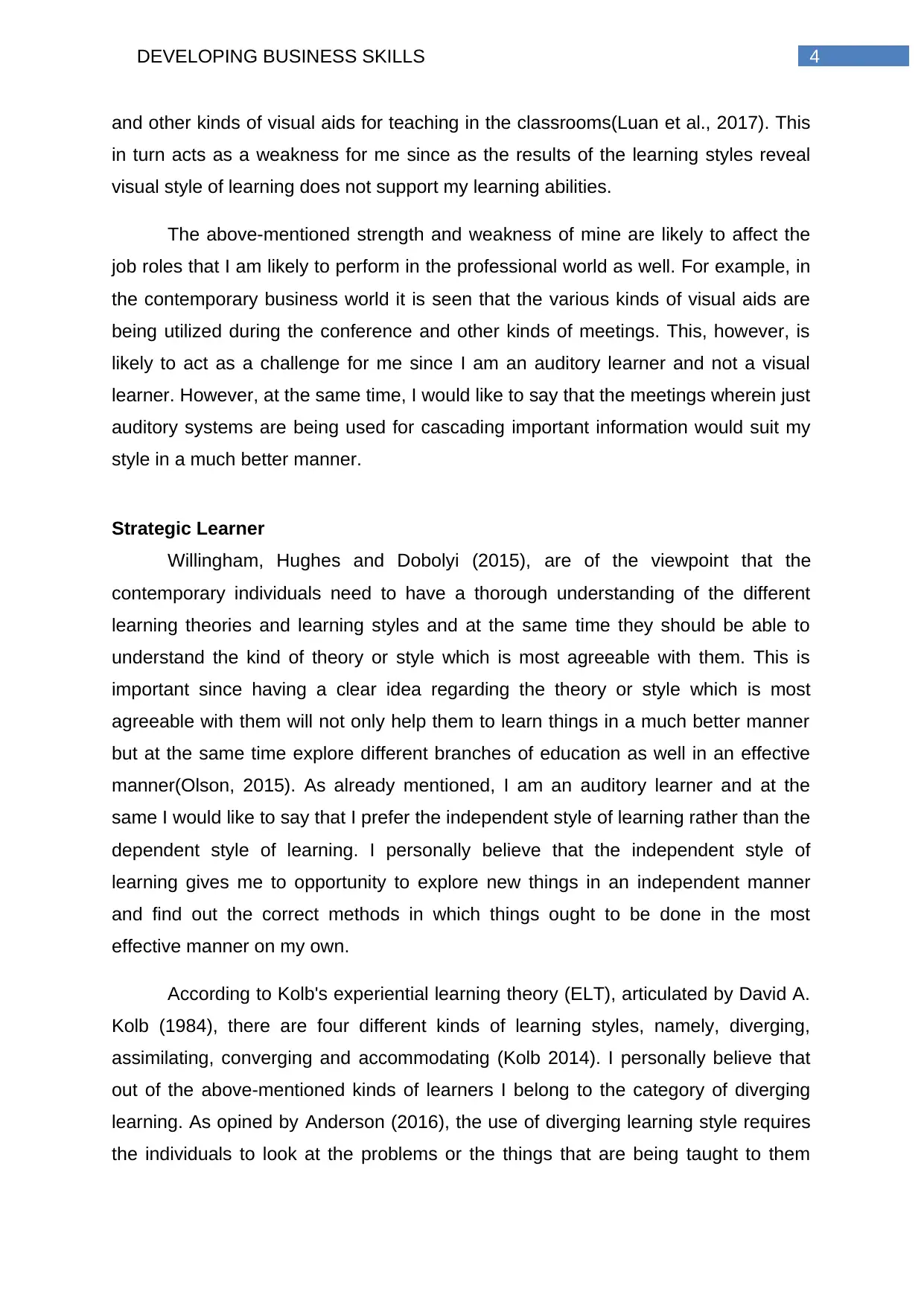
4DEVELOPING BUSINESS SKILLS
and other kinds of visual aids for teaching in the classrooms(Luan et al., 2017). This
in turn acts as a weakness for me since as the results of the learning styles reveal
visual style of learning does not support my learning abilities.
The above-mentioned strength and weakness of mine are likely to affect the
job roles that I am likely to perform in the professional world as well. For example, in
the contemporary business world it is seen that the various kinds of visual aids are
being utilized during the conference and other kinds of meetings. This, however, is
likely to act as a challenge for me since I am an auditory learner and not a visual
learner. However, at the same time, I would like to say that the meetings wherein just
auditory systems are being used for cascading important information would suit my
style in a much better manner.
Strategic Learner
Willingham, Hughes and Dobolyi (2015), are of the viewpoint that the
contemporary individuals need to have a thorough understanding of the different
learning theories and learning styles and at the same time they should be able to
understand the kind of theory or style which is most agreeable with them. This is
important since having a clear idea regarding the theory or style which is most
agreeable with them will not only help them to learn things in a much better manner
but at the same time explore different branches of education as well in an effective
manner(Olson, 2015). As already mentioned, I am an auditory learner and at the
same I would like to say that I prefer the independent style of learning rather than the
dependent style of learning. I personally believe that the independent style of
learning gives me to opportunity to explore new things in an independent manner
and find out the correct methods in which things ought to be done in the most
effective manner on my own.
According to Kolb's experiential learning theory (ELT), articulated by David A.
Kolb (1984), there are four different kinds of learning styles, namely, diverging,
assimilating, converging and accommodating (Kolb 2014). I personally believe that
out of the above-mentioned kinds of learners I belong to the category of diverging
learning. As opined by Anderson (2016), the use of diverging learning style requires
the individuals to look at the problems or the things that are being taught to them
and other kinds of visual aids for teaching in the classrooms(Luan et al., 2017). This
in turn acts as a weakness for me since as the results of the learning styles reveal
visual style of learning does not support my learning abilities.
The above-mentioned strength and weakness of mine are likely to affect the
job roles that I am likely to perform in the professional world as well. For example, in
the contemporary business world it is seen that the various kinds of visual aids are
being utilized during the conference and other kinds of meetings. This, however, is
likely to act as a challenge for me since I am an auditory learner and not a visual
learner. However, at the same time, I would like to say that the meetings wherein just
auditory systems are being used for cascading important information would suit my
style in a much better manner.
Strategic Learner
Willingham, Hughes and Dobolyi (2015), are of the viewpoint that the
contemporary individuals need to have a thorough understanding of the different
learning theories and learning styles and at the same time they should be able to
understand the kind of theory or style which is most agreeable with them. This is
important since having a clear idea regarding the theory or style which is most
agreeable with them will not only help them to learn things in a much better manner
but at the same time explore different branches of education as well in an effective
manner(Olson, 2015). As already mentioned, I am an auditory learner and at the
same I would like to say that I prefer the independent style of learning rather than the
dependent style of learning. I personally believe that the independent style of
learning gives me to opportunity to explore new things in an independent manner
and find out the correct methods in which things ought to be done in the most
effective manner on my own.
According to Kolb's experiential learning theory (ELT), articulated by David A.
Kolb (1984), there are four different kinds of learning styles, namely, diverging,
assimilating, converging and accommodating (Kolb 2014). I personally believe that
out of the above-mentioned kinds of learners I belong to the category of diverging
learning. As opined by Anderson (2016), the use of diverging learning style requires
the individuals to look at the problems or the things that are being taught to them
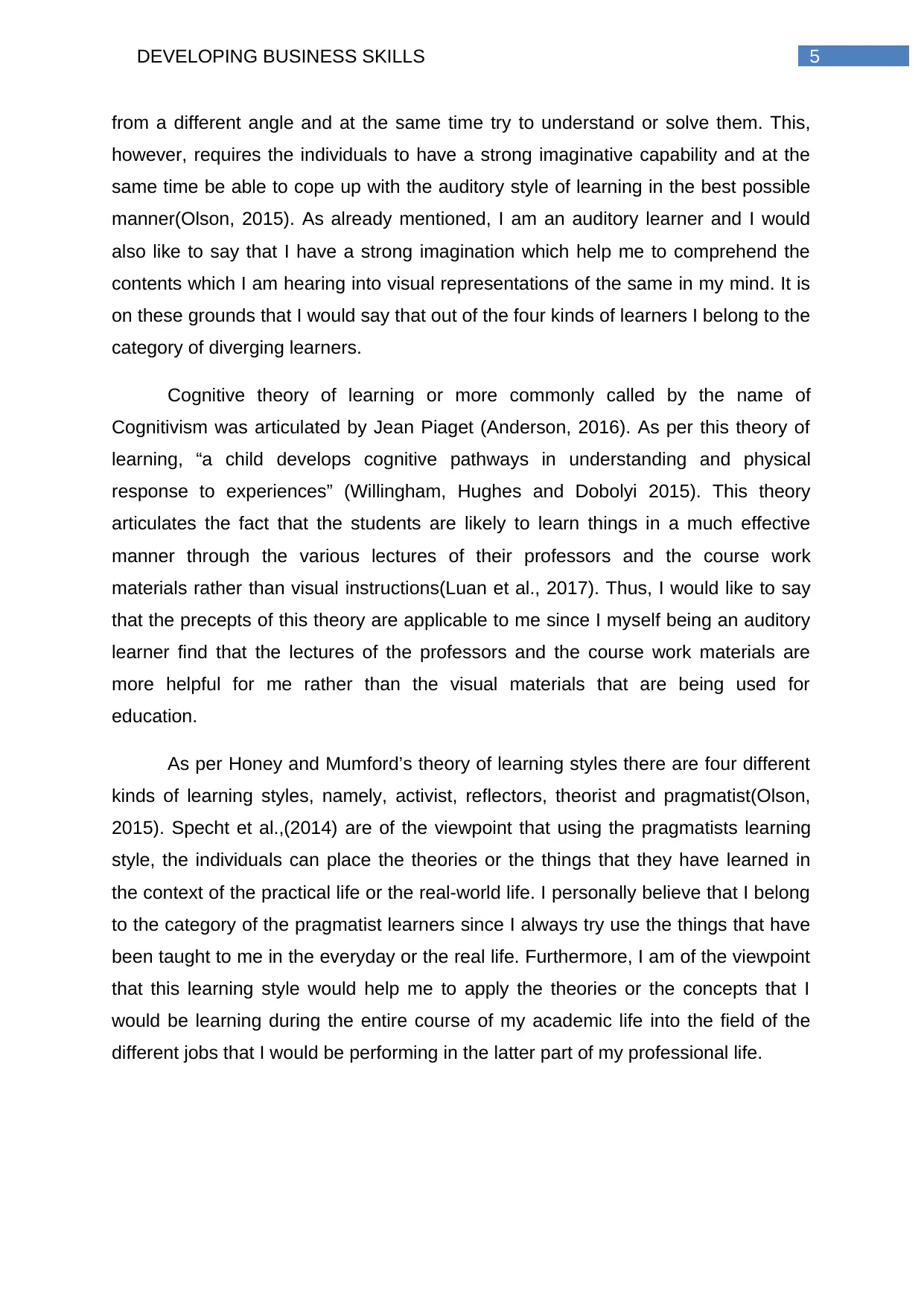
5DEVELOPING BUSINESS SKILLS
from a different angle and at the same time try to understand or solve them. This,
however, requires the individuals to have a strong imaginative capability and at the
same time be able to cope up with the auditory style of learning in the best possible
manner(Olson, 2015). As already mentioned, I am an auditory learner and I would
also like to say that I have a strong imagination which help me to comprehend the
contents which I am hearing into visual representations of the same in my mind. It is
on these grounds that I would say that out of the four kinds of learners I belong to the
category of diverging learners.
Cognitive theory of learning or more commonly called by the name of
Cognitivism was articulated by Jean Piaget (Anderson, 2016). As per this theory of
learning, “a child develops cognitive pathways in understanding and physical
response to experiences” (Willingham, Hughes and Dobolyi 2015). This theory
articulates the fact that the students are likely to learn things in a much effective
manner through the various lectures of their professors and the course work
materials rather than visual instructions(Luan et al., 2017). Thus, I would like to say
that the precepts of this theory are applicable to me since I myself being an auditory
learner find that the lectures of the professors and the course work materials are
more helpful for me rather than the visual materials that are being used for
education.
As per Honey and Mumford’s theory of learning styles there are four different
kinds of learning styles, namely, activist, reflectors, theorist and pragmatist(Olson,
2015). Specht et al.,(2014) are of the viewpoint that using the pragmatists learning
style, the individuals can place the theories or the things that they have learned in
the context of the practical life or the real-world life. I personally believe that I belong
to the category of the pragmatist learners since I always try use the things that have
been taught to me in the everyday or the real life. Furthermore, I am of the viewpoint
that this learning style would help me to apply the theories or the concepts that I
would be learning during the entire course of my academic life into the field of the
different jobs that I would be performing in the latter part of my professional life.
from a different angle and at the same time try to understand or solve them. This,
however, requires the individuals to have a strong imaginative capability and at the
same time be able to cope up with the auditory style of learning in the best possible
manner(Olson, 2015). As already mentioned, I am an auditory learner and I would
also like to say that I have a strong imagination which help me to comprehend the
contents which I am hearing into visual representations of the same in my mind. It is
on these grounds that I would say that out of the four kinds of learners I belong to the
category of diverging learners.
Cognitive theory of learning or more commonly called by the name of
Cognitivism was articulated by Jean Piaget (Anderson, 2016). As per this theory of
learning, “a child develops cognitive pathways in understanding and physical
response to experiences” (Willingham, Hughes and Dobolyi 2015). This theory
articulates the fact that the students are likely to learn things in a much effective
manner through the various lectures of their professors and the course work
materials rather than visual instructions(Luan et al., 2017). Thus, I would like to say
that the precepts of this theory are applicable to me since I myself being an auditory
learner find that the lectures of the professors and the course work materials are
more helpful for me rather than the visual materials that are being used for
education.
As per Honey and Mumford’s theory of learning styles there are four different
kinds of learning styles, namely, activist, reflectors, theorist and pragmatist(Olson,
2015). Specht et al.,(2014) are of the viewpoint that using the pragmatists learning
style, the individuals can place the theories or the things that they have learned in
the context of the practical life or the real-world life. I personally believe that I belong
to the category of the pragmatist learners since I always try use the things that have
been taught to me in the everyday or the real life. Furthermore, I am of the viewpoint
that this learning style would help me to apply the theories or the concepts that I
would be learning during the entire course of my academic life into the field of the
different jobs that I would be performing in the latter part of my professional life.
⊘ This is a preview!⊘
Do you want full access?
Subscribe today to unlock all pages.

Trusted by 1+ million students worldwide
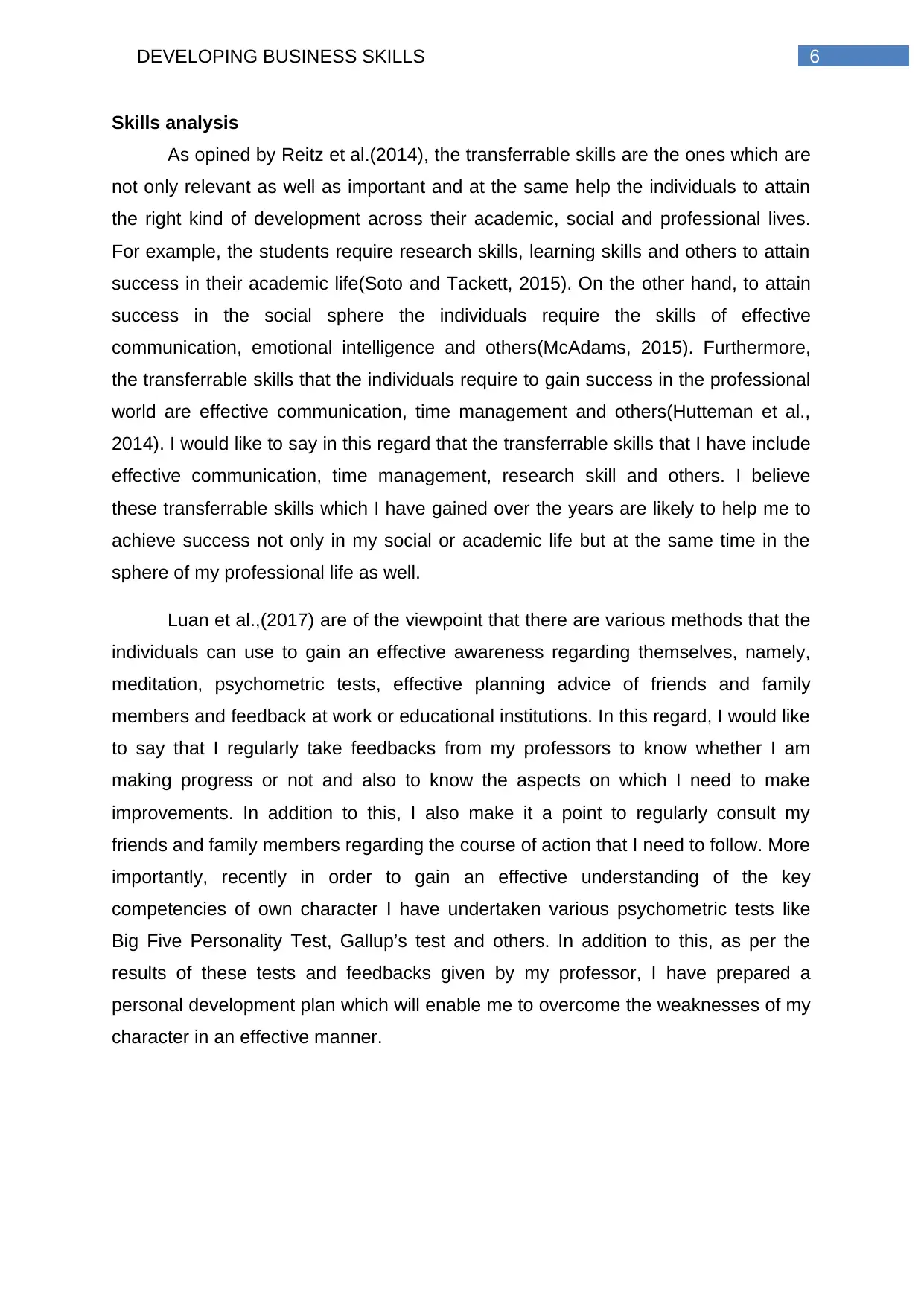
6DEVELOPING BUSINESS SKILLS
Skills analysis
As opined by Reitz et al.(2014), the transferrable skills are the ones which are
not only relevant as well as important and at the same help the individuals to attain
the right kind of development across their academic, social and professional lives.
For example, the students require research skills, learning skills and others to attain
success in their academic life(Soto and Tackett, 2015). On the other hand, to attain
success in the social sphere the individuals require the skills of effective
communication, emotional intelligence and others(McAdams, 2015). Furthermore,
the transferrable skills that the individuals require to gain success in the professional
world are effective communication, time management and others(Hutteman et al.,
2014). I would like to say in this regard that the transferrable skills that I have include
effective communication, time management, research skill and others. I believe
these transferrable skills which I have gained over the years are likely to help me to
achieve success not only in my social or academic life but at the same time in the
sphere of my professional life as well.
Luan et al.,(2017) are of the viewpoint that there are various methods that the
individuals can use to gain an effective awareness regarding themselves, namely,
meditation, psychometric tests, effective planning advice of friends and family
members and feedback at work or educational institutions. In this regard, I would like
to say that I regularly take feedbacks from my professors to know whether I am
making progress or not and also to know the aspects on which I need to make
improvements. In addition to this, I also make it a point to regularly consult my
friends and family members regarding the course of action that I need to follow. More
importantly, recently in order to gain an effective understanding of the key
competencies of own character I have undertaken various psychometric tests like
Big Five Personality Test, Gallup’s test and others. In addition to this, as per the
results of these tests and feedbacks given by my professor, I have prepared a
personal development plan which will enable me to overcome the weaknesses of my
character in an effective manner.
Skills analysis
As opined by Reitz et al.(2014), the transferrable skills are the ones which are
not only relevant as well as important and at the same help the individuals to attain
the right kind of development across their academic, social and professional lives.
For example, the students require research skills, learning skills and others to attain
success in their academic life(Soto and Tackett, 2015). On the other hand, to attain
success in the social sphere the individuals require the skills of effective
communication, emotional intelligence and others(McAdams, 2015). Furthermore,
the transferrable skills that the individuals require to gain success in the professional
world are effective communication, time management and others(Hutteman et al.,
2014). I would like to say in this regard that the transferrable skills that I have include
effective communication, time management, research skill and others. I believe
these transferrable skills which I have gained over the years are likely to help me to
achieve success not only in my social or academic life but at the same time in the
sphere of my professional life as well.
Luan et al.,(2017) are of the viewpoint that there are various methods that the
individuals can use to gain an effective awareness regarding themselves, namely,
meditation, psychometric tests, effective planning advice of friends and family
members and feedback at work or educational institutions. In this regard, I would like
to say that I regularly take feedbacks from my professors to know whether I am
making progress or not and also to know the aspects on which I need to make
improvements. In addition to this, I also make it a point to regularly consult my
friends and family members regarding the course of action that I need to follow. More
importantly, recently in order to gain an effective understanding of the key
competencies of own character I have undertaken various psychometric tests like
Big Five Personality Test, Gallup’s test and others. In addition to this, as per the
results of these tests and feedbacks given by my professor, I have prepared a
personal development plan which will enable me to overcome the weaknesses of my
character in an effective manner.
Paraphrase This Document
Need a fresh take? Get an instant paraphrase of this document with our AI Paraphraser
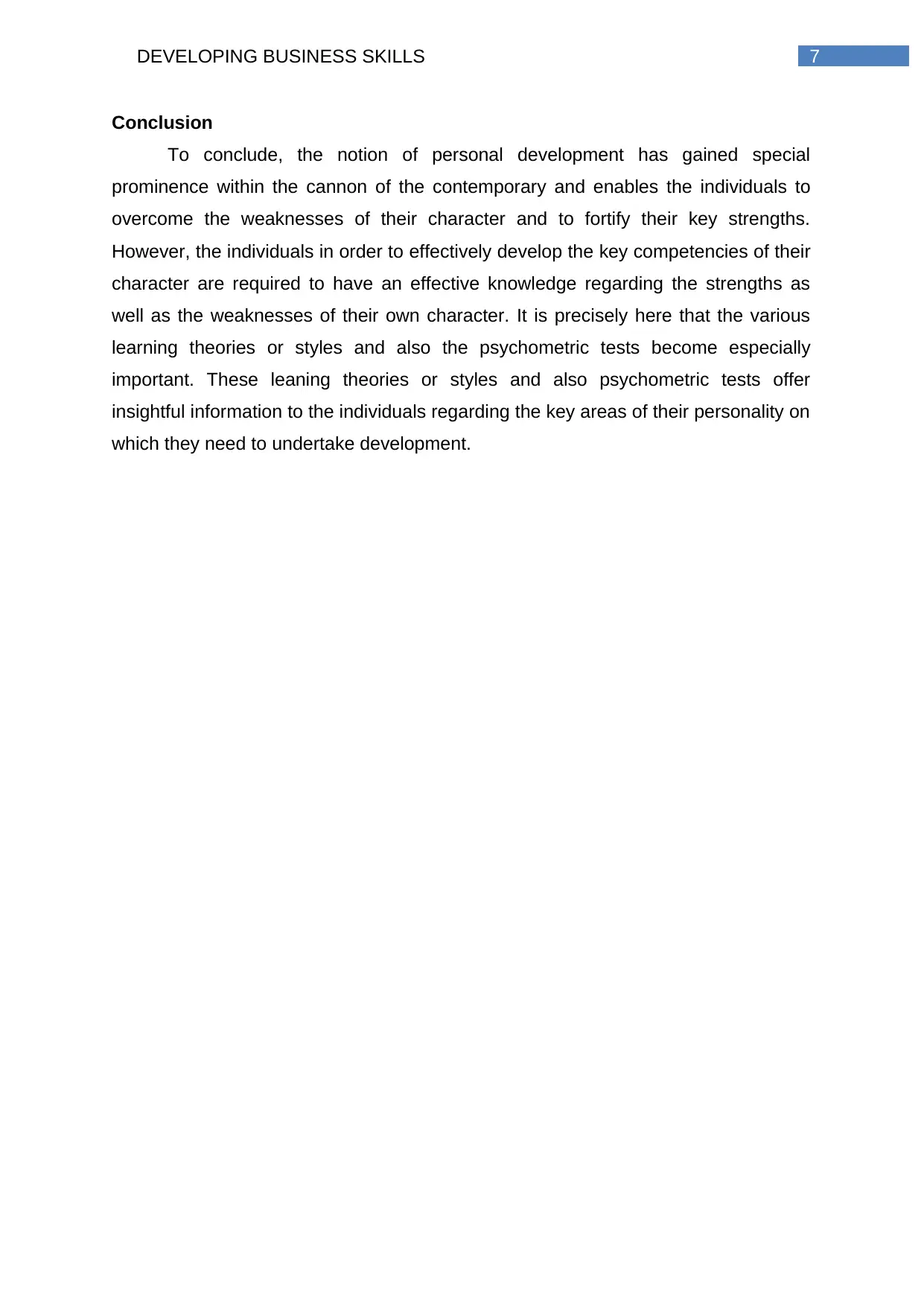
7DEVELOPING BUSINESS SKILLS
Conclusion
To conclude, the notion of personal development has gained special
prominence within the cannon of the contemporary and enables the individuals to
overcome the weaknesses of their character and to fortify their key strengths.
However, the individuals in order to effectively develop the key competencies of their
character are required to have an effective knowledge regarding the strengths as
well as the weaknesses of their own character. It is precisely here that the various
learning theories or styles and also the psychometric tests become especially
important. These leaning theories or styles and also psychometric tests offer
insightful information to the individuals regarding the key areas of their personality on
which they need to undertake development.
Conclusion
To conclude, the notion of personal development has gained special
prominence within the cannon of the contemporary and enables the individuals to
overcome the weaknesses of their character and to fortify their key strengths.
However, the individuals in order to effectively develop the key competencies of their
character are required to have an effective knowledge regarding the strengths as
well as the weaknesses of their own character. It is precisely here that the various
learning theories or styles and also the psychometric tests become especially
important. These leaning theories or styles and also psychometric tests offer
insightful information to the individuals regarding the key areas of their personality on
which they need to undertake development.
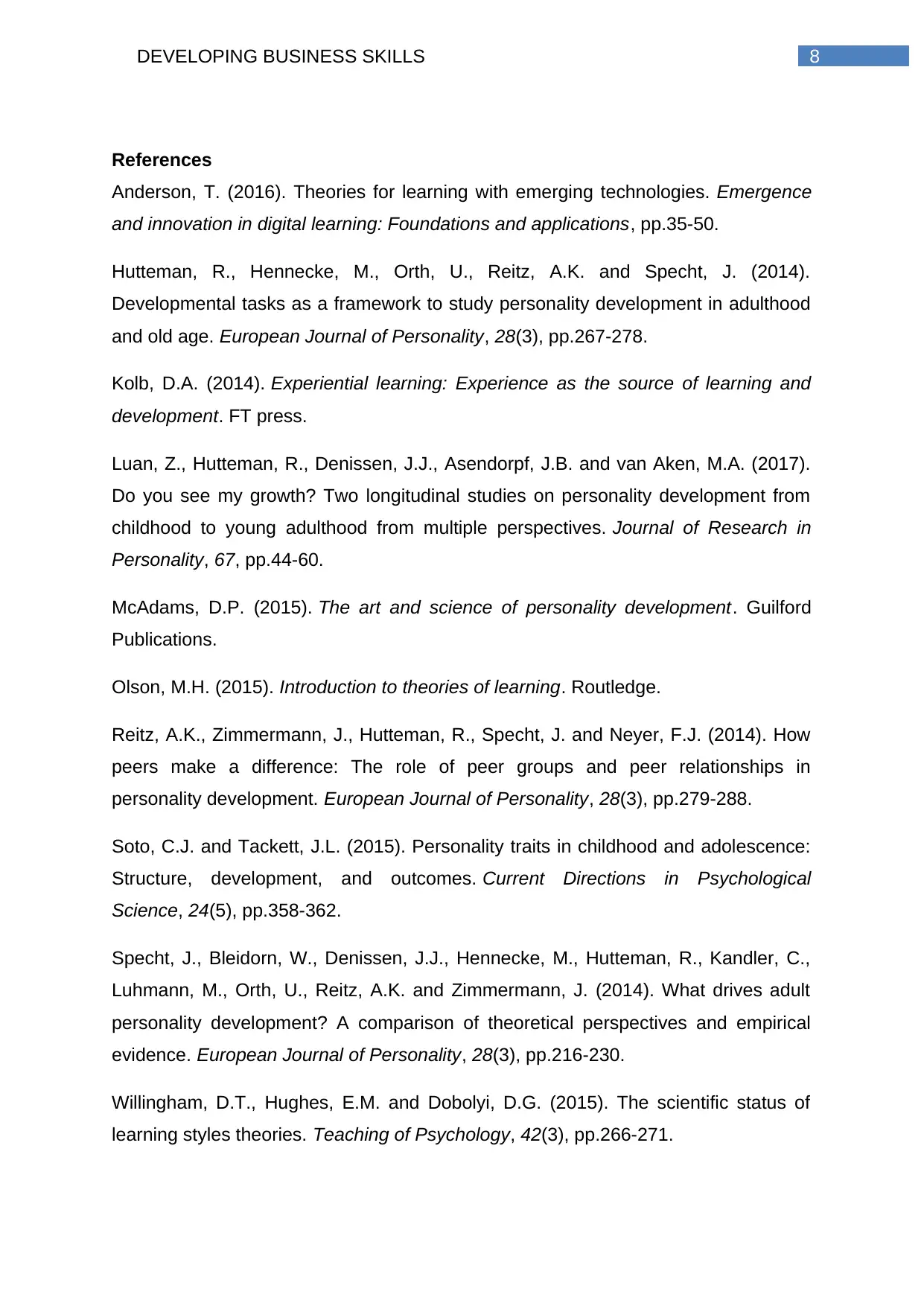
8DEVELOPING BUSINESS SKILLS
References
Anderson, T. (2016). Theories for learning with emerging technologies. Emergence
and innovation in digital learning: Foundations and applications, pp.35-50.
Hutteman, R., Hennecke, M., Orth, U., Reitz, A.K. and Specht, J. (2014).
Developmental tasks as a framework to study personality development in adulthood
and old age. European Journal of Personality, 28(3), pp.267-278.
Kolb, D.A. (2014). Experiential learning: Experience as the source of learning and
development. FT press.
Luan, Z., Hutteman, R., Denissen, J.J., Asendorpf, J.B. and van Aken, M.A. (2017).
Do you see my growth? Two longitudinal studies on personality development from
childhood to young adulthood from multiple perspectives. Journal of Research in
Personality, 67, pp.44-60.
McAdams, D.P. (2015). The art and science of personality development. Guilford
Publications.
Olson, M.H. (2015). Introduction to theories of learning. Routledge.
Reitz, A.K., Zimmermann, J., Hutteman, R., Specht, J. and Neyer, F.J. (2014). How
peers make a difference: The role of peer groups and peer relationships in
personality development. European Journal of Personality, 28(3), pp.279-288.
Soto, C.J. and Tackett, J.L. (2015). Personality traits in childhood and adolescence:
Structure, development, and outcomes. Current Directions in Psychological
Science, 24(5), pp.358-362.
Specht, J., Bleidorn, W., Denissen, J.J., Hennecke, M., Hutteman, R., Kandler, C.,
Luhmann, M., Orth, U., Reitz, A.K. and Zimmermann, J. (2014). What drives adult
personality development? A comparison of theoretical perspectives and empirical
evidence. European Journal of Personality, 28(3), pp.216-230.
Willingham, D.T., Hughes, E.M. and Dobolyi, D.G. (2015). The scientific status of
learning styles theories. Teaching of Psychology, 42(3), pp.266-271.
References
Anderson, T. (2016). Theories for learning with emerging technologies. Emergence
and innovation in digital learning: Foundations and applications, pp.35-50.
Hutteman, R., Hennecke, M., Orth, U., Reitz, A.K. and Specht, J. (2014).
Developmental tasks as a framework to study personality development in adulthood
and old age. European Journal of Personality, 28(3), pp.267-278.
Kolb, D.A. (2014). Experiential learning: Experience as the source of learning and
development. FT press.
Luan, Z., Hutteman, R., Denissen, J.J., Asendorpf, J.B. and van Aken, M.A. (2017).
Do you see my growth? Two longitudinal studies on personality development from
childhood to young adulthood from multiple perspectives. Journal of Research in
Personality, 67, pp.44-60.
McAdams, D.P. (2015). The art and science of personality development. Guilford
Publications.
Olson, M.H. (2015). Introduction to theories of learning. Routledge.
Reitz, A.K., Zimmermann, J., Hutteman, R., Specht, J. and Neyer, F.J. (2014). How
peers make a difference: The role of peer groups and peer relationships in
personality development. European Journal of Personality, 28(3), pp.279-288.
Soto, C.J. and Tackett, J.L. (2015). Personality traits in childhood and adolescence:
Structure, development, and outcomes. Current Directions in Psychological
Science, 24(5), pp.358-362.
Specht, J., Bleidorn, W., Denissen, J.J., Hennecke, M., Hutteman, R., Kandler, C.,
Luhmann, M., Orth, U., Reitz, A.K. and Zimmermann, J. (2014). What drives adult
personality development? A comparison of theoretical perspectives and empirical
evidence. European Journal of Personality, 28(3), pp.216-230.
Willingham, D.T., Hughes, E.M. and Dobolyi, D.G. (2015). The scientific status of
learning styles theories. Teaching of Psychology, 42(3), pp.266-271.
⊘ This is a preview!⊘
Do you want full access?
Subscribe today to unlock all pages.

Trusted by 1+ million students worldwide
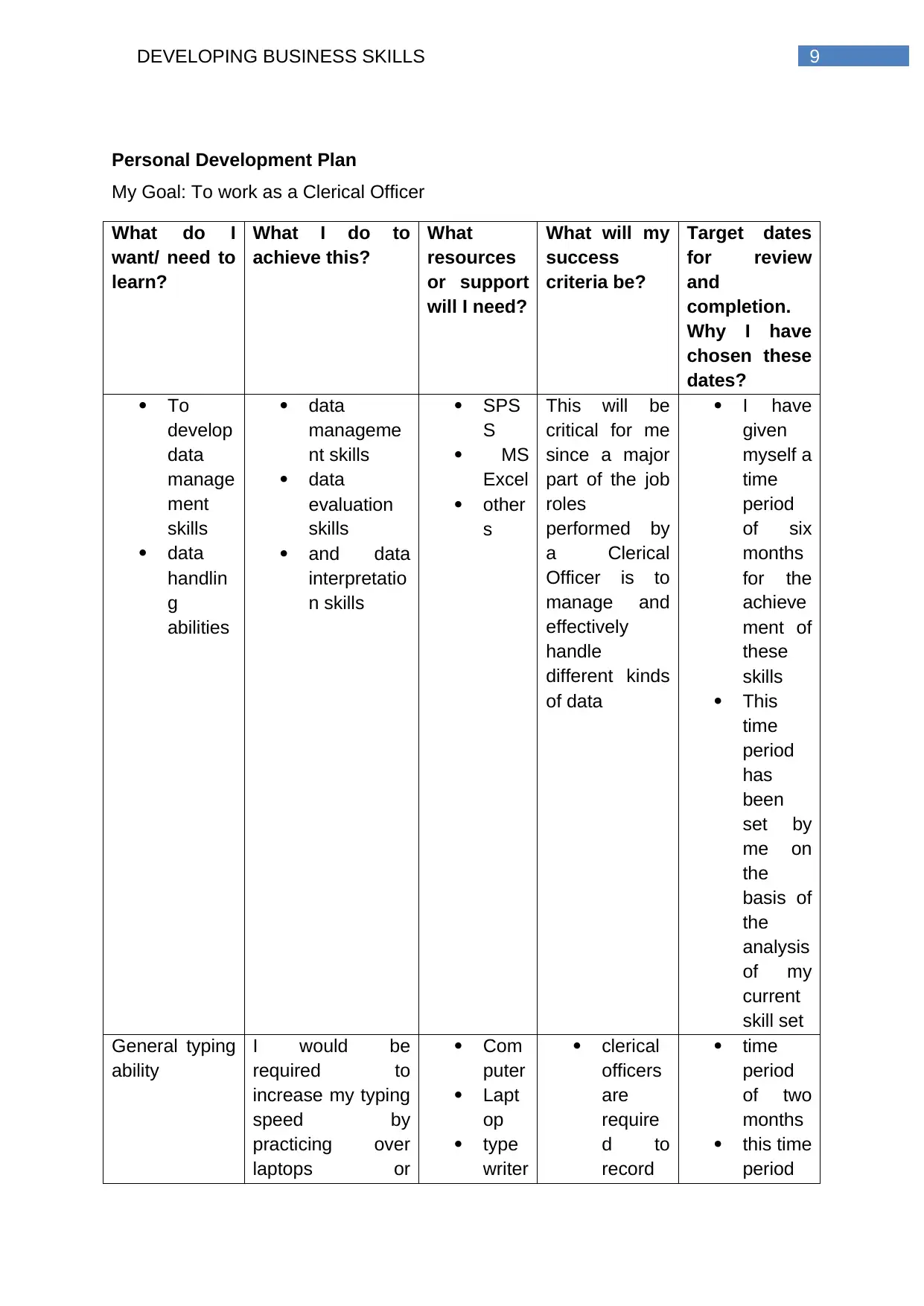
9DEVELOPING BUSINESS SKILLS
Personal Development Plan
My Goal: To work as a Clerical Officer
What do I
want/ need to
learn?
What I do to
achieve this?
What
resources
or support
will I need?
What will my
success
criteria be?
Target dates
for review
and
completion.
Why I have
chosen these
dates?
To
develop
data
manage
ment
skills
data
handlin
g
abilities
data
manageme
nt skills
data
evaluation
skills
and data
interpretatio
n skills
SPS
S
MS
Excel
other
s
This will be
critical for me
since a major
part of the job
roles
performed by
a Clerical
Officer is to
manage and
effectively
handle
different kinds
of data
I have
given
myself a
time
period
of six
months
for the
achieve
ment of
these
skills
This
time
period
has
been
set by
me on
the
basis of
the
analysis
of my
current
skill set
General typing
ability
I would be
required to
increase my typing
speed by
practicing over
laptops or
Com
puter
Lapt
op
type
writer
clerical
officers
are
require
d to
record
time
period
of two
months
this time
period
Personal Development Plan
My Goal: To work as a Clerical Officer
What do I
want/ need to
learn?
What I do to
achieve this?
What
resources
or support
will I need?
What will my
success
criteria be?
Target dates
for review
and
completion.
Why I have
chosen these
dates?
To
develop
data
manage
ment
skills
data
handlin
g
abilities
data
manageme
nt skills
data
evaluation
skills
and data
interpretatio
n skills
SPS
S
MS
Excel
other
s
This will be
critical for me
since a major
part of the job
roles
performed by
a Clerical
Officer is to
manage and
effectively
handle
different kinds
of data
I have
given
myself a
time
period
of six
months
for the
achieve
ment of
these
skills
This
time
period
has
been
set by
me on
the
basis of
the
analysis
of my
current
skill set
General typing
ability
I would be
required to
increase my typing
speed by
practicing over
laptops or
Com
puter
Lapt
op
type
writer
clerical
officers
are
require
d to
record
time
period
of two
months
this time
period
Paraphrase This Document
Need a fresh take? Get an instant paraphrase of this document with our AI Paraphraser
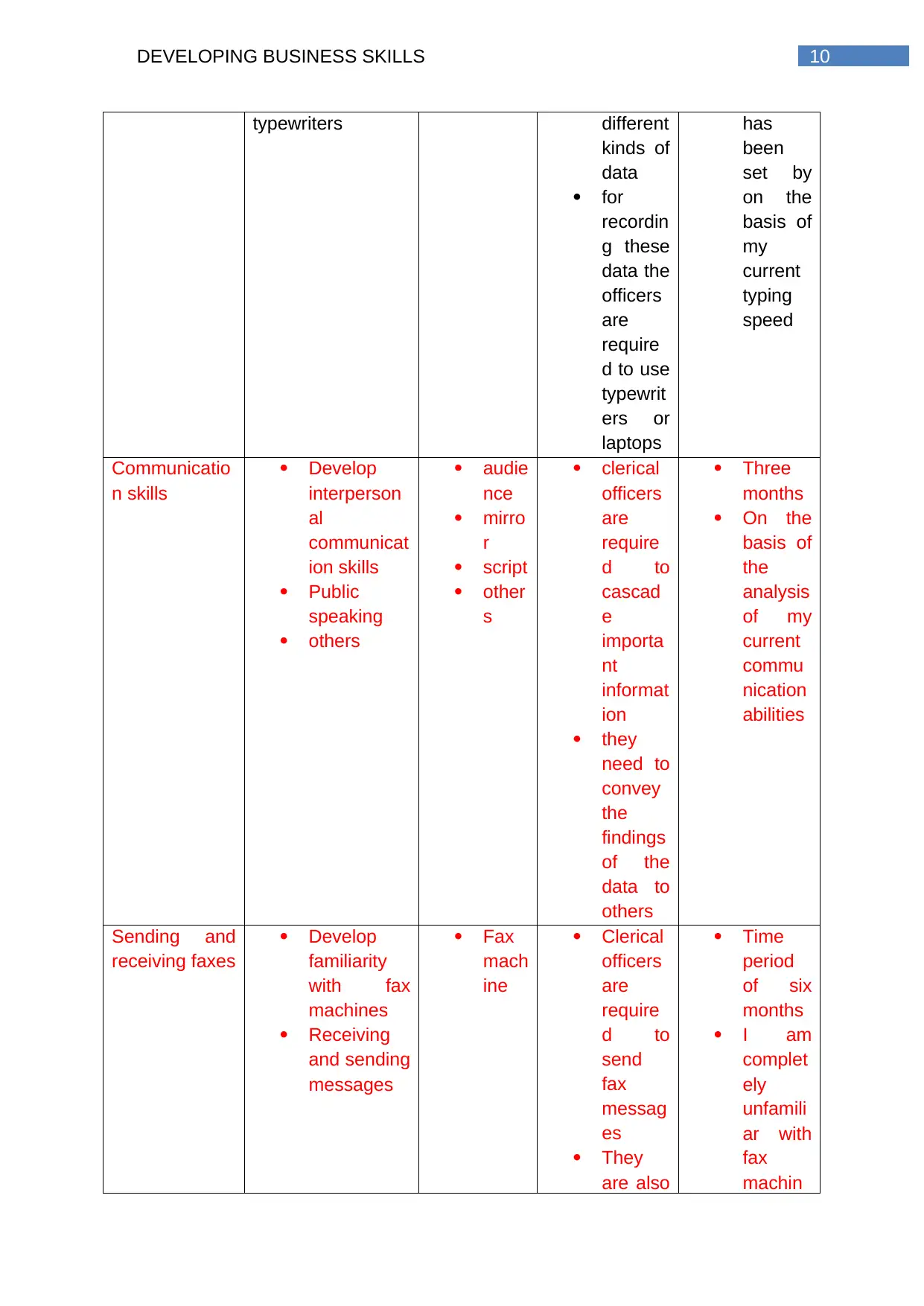
10DEVELOPING BUSINESS SKILLS
typewriters different
kinds of
data
for
recordin
g these
data the
officers
are
require
d to use
typewrit
ers or
laptops
has
been
set by
on the
basis of
my
current
typing
speed
Communicatio
n skills
Develop
interperson
al
communicat
ion skills
Public
speaking
others
audie
nce
mirro
r
script
other
s
clerical
officers
are
require
d to
cascad
e
importa
nt
informat
ion
they
need to
convey
the
findings
of the
data to
others
Three
months
On the
basis of
the
analysis
of my
current
commu
nication
abilities
Sending and
receiving faxes
Develop
familiarity
with fax
machines
Receiving
and sending
messages
Fax
mach
ine
Clerical
officers
are
require
d to
send
fax
messag
es
They
are also
Time
period
of six
months
I am
complet
ely
unfamili
ar with
fax
machin
typewriters different
kinds of
data
for
recordin
g these
data the
officers
are
require
d to use
typewrit
ers or
laptops
has
been
set by
on the
basis of
my
current
typing
speed
Communicatio
n skills
Develop
interperson
al
communicat
ion skills
Public
speaking
others
audie
nce
mirro
r
script
other
s
clerical
officers
are
require
d to
cascad
e
importa
nt
informat
ion
they
need to
convey
the
findings
of the
data to
others
Three
months
On the
basis of
the
analysis
of my
current
commu
nication
abilities
Sending and
receiving faxes
Develop
familiarity
with fax
machines
Receiving
and sending
messages
Fax
mach
ine
Clerical
officers
are
require
d to
send
fax
messag
es
They
are also
Time
period
of six
months
I am
complet
ely
unfamili
ar with
fax
machin
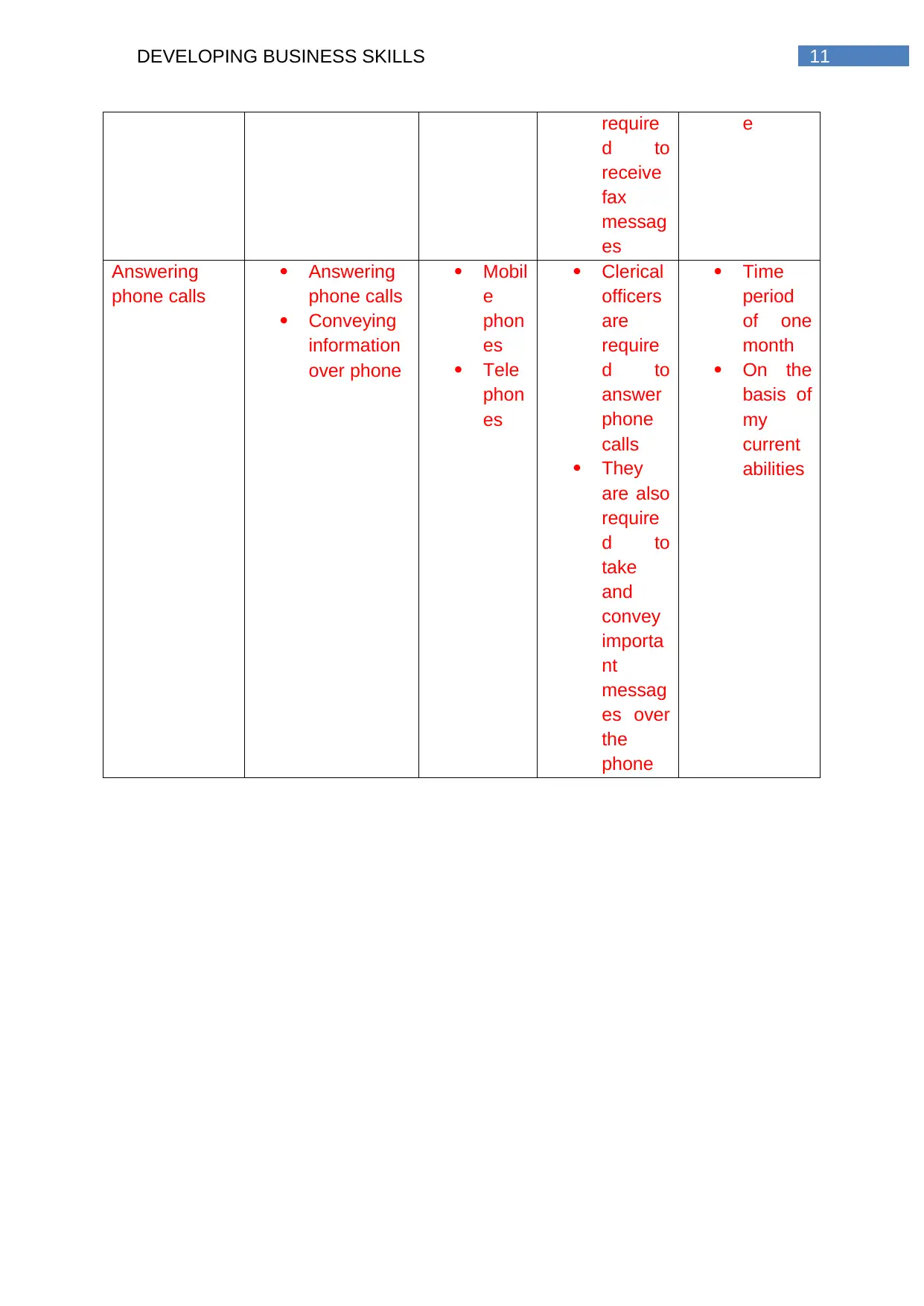
11DEVELOPING BUSINESS SKILLS
require
d to
receive
fax
messag
es
e
Answering
phone calls
Answering
phone calls
Conveying
information
over phone
Mobil
e
phon
es
Tele
phon
es
Clerical
officers
are
require
d to
answer
phone
calls
They
are also
require
d to
take
and
convey
importa
nt
messag
es over
the
phone
Time
period
of one
month
On the
basis of
my
current
abilities
require
d to
receive
fax
messag
es
e
Answering
phone calls
Answering
phone calls
Conveying
information
over phone
Mobil
e
phon
es
Tele
phon
es
Clerical
officers
are
require
d to
answer
phone
calls
They
are also
require
d to
take
and
convey
importa
nt
messag
es over
the
phone
Time
period
of one
month
On the
basis of
my
current
abilities
⊘ This is a preview!⊘
Do you want full access?
Subscribe today to unlock all pages.

Trusted by 1+ million students worldwide
1 out of 33
Related Documents
Your All-in-One AI-Powered Toolkit for Academic Success.
+13062052269
info@desklib.com
Available 24*7 on WhatsApp / Email
![[object Object]](/_next/static/media/star-bottom.7253800d.svg)
Unlock your academic potential
Copyright © 2020–2026 A2Z Services. All Rights Reserved. Developed and managed by ZUCOL.



